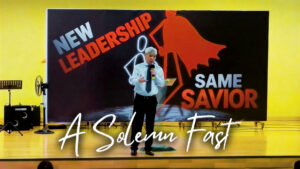Title: The Sick Sinner
Scripture Reading: Psalm 38
Lord, do not rebuke me in your anger or discipline me in your wrath.Your arrows have pierced me, and your hand has come down on me. Because of your wrath there is no health in my body;there is no soundness in my bones because of my sin.My guilt has overwhelmed melike a burden too heavy to bear.My wounds fester and are loathsomebecause of my sinful folly.I am bowed down and brought very low;all day long I go about mourning.My back is filled with searing pain;there is no health in my body.I am feeble and utterly crushed;I groan in anguish of heart.All my longings lie open before you, Lord;my sighing is not hidden from you.My heart pounds, my strength fails me;even the light has gone from my eyes.My friends and companions avoid me because of my wounds;my neighbors stay far away.Those who want to kill me set their traps,those who would harm me talk of my ruin;all day long they scheme and lie.I am like the deaf, who cannot hear,like the mute, who cannot speak;I have become like one who does not hear,whose mouth can offer no reply.Lord, I wait for you;you will answer, Lord my God.For I said, “Do not let them gloator exalt themselves over me when my feet slip.”For I am about to fall,and my pain is ever with me.I confess my iniquity; I am troubled by my sin.Many have become my enemies without cause; those who hate me without reason are numerous. Those who repay my good with evil lodge accusations against me, though I seek only to do what is good. Lord, do not forsake me; do not be far from me, my God.Come quickly to help me,my Lord and my Savior.
Psalm 38 is a song full of pain and dark with guilt.
Most likely it is written by David but as you read this psalm you are reminded of Job because he too, went through a similar experience described in Psalm 38
In the Old Testament, in Jewish thought sin and sickness were related.
Even in the New Testament, in the disciples’ culture, sickness and suffering were often seen as a punishment for sin. This is verified in John 9:2 when Jesus’ disciples asked him, ‘Master, who did sin, this man, or his parents, that he was born blind?’
In other words, not everything that happens to a person happens because they did something wrong. Hardship and suffering, including persecution, were not surefire signs of divine retribution
Here we are given three aspects of the problems of David:
- The physical problems
- The attack of enemies
- The rejection of friends.
Like Job, many of us wonder why?
- Have I offended God?
- Have I violated God’s law?
- Is this a judgment for sin or a random occurrence of evil events and people in a fallen world?
- The true conditions of the Psalmist
Psalm 38:1-3 says, ‘O LORD, rebuke me not in thy wrath; neither chasten me in thy hot displeasure. For thine arrows stick fast in me, and thy hand presseth me sore. There is no soundness in my flesh because of thine anger, neither is there any rest in my bones because of my sin .
The Psalmist describes his condition and feelings. Do you feel YHWH’s displeasure and wrath?
- David senses YHWH’s displeasure
He pleads with YHWH not to rebuke him in His wrath
- He ask YHWH not to chasten him in His burning anger.
The verb rebuke is often used of covenant violations. When David says, ‘for thine arrows stick fast to me. And thy hand presseth me sore,’ he feels YHWH’s punishment. The physical result of YHWH’s displeasure because of sin is described here.
- No soundness in my flesh
- No health in my bones
- Wound (literally it means stripes that grow foul and fester)
- Bent over. He is bowed down in mourning.
- Loins are filled with burning
- Benumbed (literally he is spent)
- Crushed
- Groan (that is, like an animal sounds)
When he says his eyes fail, it is not referring to blindness but is an idiom for lack of health, joy and peace.
There is interpersonal issues:
- Loved ones stand aloof
- Friends stand aloof
- Kinsmen stand far off
His enemies seek his death:
- They lay snares
- They threaten destruction
- They devise treachery all day long.
- The Response of the Psalmist
Psalm 38:15: ‘Lord, I wait for you; you will answer.’
Whatever you are facing, your trust should be in God. Your cry should be towards God. Psalm 38 is examples of troubles: traps, tests and temptations and how to handle them.
David cried to God. He knew that God was able to forgive him, rescue him, and heal him. Whatever your failings or whatever difficulties you may face, you too can bring them to God in prayer.
David followed a wise path, drawing near to the LORD though he sensed both God’s wrath and displeasure.
Charles Spurgeon says, ‘the anger of others I can bear, but not thine. As thy love is most sweet to my heart, so thy displeasure is most cutting to my conscience.’
The petition of the Psalmist here preferred is, that Jehovah would not condemn as a judge, but chasten as a father, for the amendment and preservation of the offender
Please understand that Jesus, ‘the holy Jesus, at the time of his passion, received these arrows (meant for us) and sustained this weight for the sins for the whole world. Understanding the agony of Jesus at the Cross helps us to understand something of the greatness of the love that sent Him to the Cross. It was at the Cross that Jesus not only forgave us of our sin but also enabled us to enjoy the fellowship of God, forgiving others, empowering us to do likewise to our fellowmen.
For although David confesses that he is being judged for his sin – God has made this clear to him – he is nevertheless glorifying God in a way he deals with it. Primarily, he is not faulting God. David felt oppressed under the weight of his sins. Yet he believed that an honest and heartfelt telling of his misery would move God’s compassion. Sin is the wound of the soul, which must be washed with the tears of repentance, cleansed by the blood of Christ and healed by the Spirit of the Holy One.
Confession brings:
- Forgiveness from YHWH
- Forgiveness for self
- A sense of restoration of fellowship
Confession recognizes:
- Human guilt for breaking YHWH’s laws
- YHWH’s character of forgiveness and mercy
- The Response of YHWH
The story of Barak and Balaam
Numbers 23:19-23 says, ‘ God is not a man, that he should lie; neither the son of man, that he should repent: hath he said, and shall he not do it? or hath he spoken, and shall he not make it good? Behold, I have received commandment to bless: and he hath blessed; and I cannot reverse it. He hath not beheld iniquity in Jacob, neither hath he seen perverseness in Israel: the Lord his God is with him, and the shout of a king is among them. God brought them out of Egypt; he hath as it were the strength of an unicorn. Surely there is no enchantment against Jacob, neither is there any divination against Israel: according to this time it shall be said of Jacob and of Israel, What hath God wrought!’
Number 23:21 says, ‘He hath not beheld iniquity in Jacob, neither hath he seen perverseness in Israel.’
Deuteronomy 8:2 says, ‘And thou shalt remember all the way which the LORD thy God led thee these forty years in the wilderness, to humble thee, and to prove thee, to know what was in thine heart, whether thou wouldest keep his commandments or no.’
The image that Jesus died on the Cross of Calvary for us. Therefore when God sees us, He sees Jesus: no iniquity and no perverseness.’ God in his mercy shut his eyes to the evil which did exist in individuals, and for his own sake would not impute it to the chosen people. It is not that sin did not exist but because it was not imputed to them that repent and believe in Christ Jesus. God did not behold sin in the faithful soul, because he regards it not in its own nakedness, but as clothed with the righteousness of Christ, which admits not any spot or stain.
If it is personal, according to the Septuagint and the Targums, ‘one does not behold iniquity) means that the iniquity was not flagrant, was not left to gather head and volume (was not allowed to grow: because of confession of sins) until it brought down destruction upon us. The word perverseness means ‘suffering’ the natural consequence of sin. For that YHWH would not allow.
As a result of looking at Jesus, this part of the Balaam’s poem lists several things YHWH has done, will not do to Israel and thus to us.
- YHWH has sent a blessing that cannot be revoked
- YHWH has seen Israel’s problems but has not counted their sins against them
- YHWH is uniquely with them
- YHWH has established Himself as their King
- YHWH brought them out of Egypt (sin) with a strong hand
- YHWH cannot be affected by an ‘omen’ or ‘divination’. He is for Israel
- Israel will be powerful, like a young lioness. A lioness is the hunter, protector and provider of the pride.
In conclusion, Balaam prophesied that the latter end of the righteous is more blessed and desirable than his death
Balaam too prophesied that it is not possible for man to reverse the benediction which God has pronounced upon His people.
YHWH is leading us to the Holy Hill. The hill refers to the temple on Mount Moriah in Jerusalem. It is called
- Zion
- House
- Sanctuary
- Habitation
- Temple
- Mountain
- City of God.
Luke 12:36-37, ‘Let your loins be girded about, and your lights burning, and ye yourselves like unto men that wait for the lord, when he will return from the wedding, that when he cometh and knocketh, they are open unto him immediately. Blessed are those servants, whom the lord when he cometh shall find watching: verily I say unto you, that he shall gird himself,, and make them to sit down to meat, and will come forth and serve them.’





